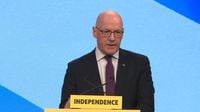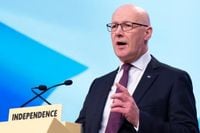On October 11, 2025, Scotland’s ruling Scottish National Party (SNP) took center stage in Aberdeen, where First Minister John Swinney staked his leadership—and perhaps his party’s future—on a bold new strategy to secure a second referendum on Scottish independence. After nearly two hours of heated debate, with grassroots members voicing both support and dissent, Swinney emerged victorious, convincing delegates to back his plan that hinges on the SNP winning a majority of seats in the Scottish Parliament’s 2026 election. The stakes could hardly be higher, with Swinney declaring, “We’re not just going to win, we are going to win big.”
For Swinney, the path forward is clear: only a decisive SNP majority at Holyrood, Scotland’s devolved parliament, will provide the “unwavering mandate” needed to demand a fresh independence vote from Westminster. According to The Scotsman, Swinney told the conference, “I’m asking us today to be clear with the Scottish people what we are offering them and what we’re asking of them. That we go to our fellow Scots between now and May with a clear, simple and unambiguous message – only a vote for the SNP will secure Scotland’s right to decide. Only a vote for the SNP will secure Scotland’s independence and that is what this party is about.”
The strategy, debated and ultimately endorsed by party members, sets a high bar: the SNP must win at least 65 seats in the 2026 election. This echoes the precedent set in 2011, when an SNP majority led to the 2014 independence referendum. Swinney, undeterred by recent polling that suggests an overall majority may be elusive, insisted, “The achievement is well within our grasp.” He further pledged to “beat” politicians at Westminster “at their own game,” responding to critics who argue that only a one-party majority will suffice for another referendum.
The conference floor, however, was anything but unified. Several grassroots members proposed amendments that would have broadened the criteria for a mandate, suggesting that a majority of pro-independence Members of the Scottish Parliament (MSPs)—regardless of party—should be enough to declare independence or at least begin negotiations. Derek Pretswell, representing the Oban and Lorn branch, passionately argued, “Every vote counts,” and emphasized that support for independence “is not confined to this party.” He questioned why Scotland must “beg…for permission to determine our own future,” warning that “Keir Starmer has already said Westminster will say no.” Pretswell’s amendment, which would have made the 2026 election a de facto referendum, was ultimately voted down, as were other similar proposals.
Not everyone in the independence movement was pleased. Alba Party leader Kenny MacAskill called Swinney’s strategy “a missed opportunity to unite the independence movement and pursue a clear, credible and popular strategy to seek and achieve a mandate for independence.” He argued that the SNP had “effectively handed a veto to Westminster over whether or not Scotland can become independent.”
Despite these internal divisions, Swinney’s resolution carried the day, supported by senior figures such as Deputy First Minister Kate Forbes, depute leader Keith Brown, and MP Stephen Gethins. Two amendments to the strategy were accepted: one reaffirming support for European Union membership, and another urging the party to work “across political boundaries” to win over voters who support independence but not necessarily the SNP. After the vote, Keith Brown told reporters, “I think the party is entirely behind what John has done. I think the conference gave a pretty strong opinion. It's a very strong strategy for the party, and that's pretty self-evident from the vote.”
According to BBC, the strategy now commits the SNP to campaign with a “clear target therefore of repeating the 2011 achievement of securing an SNP majority in the election, with at least 65 SNP MSPs, as the only uncontested way to deliver a new vote on Scotland’s future.” The message to voters is unambiguous: both their constituency and regional list votes should go to the SNP to maximize the chances of an outright majority and, with it, a new independence referendum.
But the SNP’s focus on the constitutional question drew sharp criticism from opposition parties. Scottish Labour’s Neil Bibby lambasted the government’s record, stating, “One person dies from a drug overdose almost every seven hours in Scotland, one in six Scots is on an NHS waiting list, violence is rising in our schools, and a housing emergency is causing misery for families across the country—yet the SNP has no answers. Instead, they waste their time fighting among themselves over the constitution rather than focus on fixing Scotland’s public services.” Bibby also highlighted that Labour had delivered an extra £5.2 billion for Scotland’s public services, questioning what the SNP had achieved with those funds.
Scottish Conservative MSP Rachael Hamilton was equally scathing, describing the SNP’s internal disputes as “squabbling like Nats in a sack over which version of this fantasy to back.” She dismissed the renewed independence drive as “an unwanted referendum,” and accused the party of having “lost all credibility.”
The debate over independence strategy is not just academic. With the next Holyrood election less than a year away, the SNP faces the dual challenge of rallying its base around a single, credible plan—and convincing a skeptical public that another referendum is both justified and achievable. Swinney, for his part, remains undaunted. He told delegates, “Nobody knows the tactics I’m going to deploy if we get 65 seats in the Scottish Parliament. Keep watching because Scotland is on the journey to independence.”
Meanwhile, some voices at the conference urged a broader perspective. Roz Foyer, general secretary of the Scottish Trade Unions Congress, criticized both the UK and Scottish governments for cuts that she said “kill off people's hope and trust in politics” and “poison our democracy.” She called for more powers to be devolved to Holyrood and voiced support for Scottish self-determination, arguing that every missed opportunity is “a gift to the far right.”
As the dust settles from Aberdeen, the SNP’s path is set, but the road ahead is anything but smooth. Swinney’s gamble—staking his leadership on the promise of “winning big” and delivering independence—now faces its ultimate test in the 2026 election. Whether this strategy will “break the logjam” or deepen divisions remains to be seen, but for now, Scotland’s political future is once again up for grabs.


